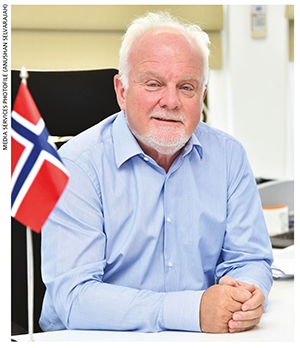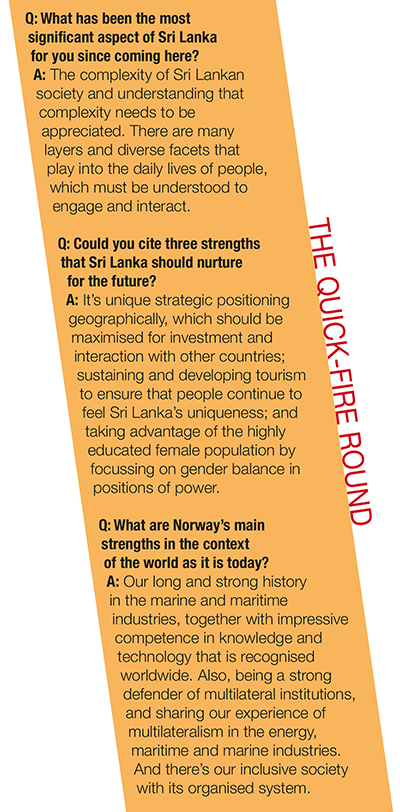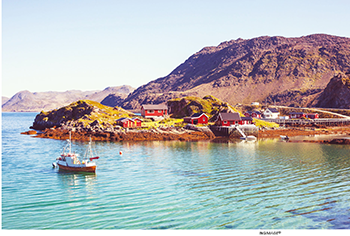DIPLOMATIC MISSION
Compiled by Savithri Rodrigo
MAKE THE MOST OF THE OCEAN
Thorbjørn Gaustadsӕther cites a common interest in protecting our ocean resources
With experience in international relations of over three decades, Norwegian Ambassador Thorbjørn Gaustadsӕther’s work has ranged over numerous countries in Africa prior to his first posting in Asia – to Sri Lanka in 2015.
Indulging in reading and playing tennis whenever his schedule permits, Gaustadsӕther’s combined specialities of development sociology, social anthropology and public administration at the University of Bergen in Norway – coupled with a year’s military service in 1974 – provide him with the requisite gestalt for working in emerging economies such as ours.
He is married with two daughters; finds Colombo among the most socially engaging cities; and enjoys the vibes, warmth and friendliness that have embraced him from the outset.
Q: How do you view Sri Lanka now compared to your initial perceptions?
A: I hadn’t been here before and didn’t know much about the country except what everyone else told me – that it is a paradise island with a long history, a changing urban environment and lovely people. I was told that I’d love it and that has surely been the case.
However, I find that Sri Lanka is more complex than I thought it would be. It’s struggling to come to terms with its history and the past. Sometimes, it is difficult to comprehend why some things happen despite common sense dictating otherwise.
Sri Lanka has so much potential in its resources especially social capital – it has the best social indicators in South Asia and a critical mass of educated people, which should place the country in a position to be clear and rational.
Q: Is there a reason for this?
A: It is difficult to understand how a country with so many educated females has so few in leadership positions. All indicators point to this potential but it has not been realised. The women in Sri Lanka are well-educated and experienced but having only six percent of them in parliament, and a few in politics and senior management positions, is quite dismal. It is truly unfortunate because the country loses out on the capabilities and competencies that more than half the population can contribute to development.
While there is definite potential to remedy this loss, traditional structures keep you boxed in – and this contains a situation that could so easily be changed. In dealing with ministries and institutions with women in high positions, I have personally experienced their efficiency, contemporary mindset and high productivity. You need to capitalise on these.
Q: What are the developments of note between Norway and Sri Lanka?
A: Sri Lanka has been changing over the last few years and opening up to the rest of the world. Optimising on this, Sri Lanka and Norway have some commonalities we could share globally.
There is receptiveness to that in Sri Lanka and keenness to build strong multilateral institutions, having more open economies and improving free trade. We have started to work together on the sustainable use of oceans given that for both our coastal countries, the ocean presents a huge resource that can be used for the benefit of the global population.
The research vessel Dr. Fridtjof Nansen, which visited Sri Lanka in June, conducted a survey of Sri Lanka’s seabed and provided information for analysis, in order to improve fisheries and spur discussions with other countries – such as those around the Bay of Bengal – on using common resources.
Q: How would you describe relations between Sri Lanka and Norway?
A: Very good because of the history that Norway has with Sri Lanka. We have always felt very welcome, the doors are always open and there’s an embracing friendship that’s wonderful.
Of course, sometimes things don’t happen as quickly as we would like but that’s normal. I believe that Sri Lanka is our partner in South Asia.
Q: What plans do you have for Sri Lanka during your tenure here?
A: I’ll be here for another year and hope to continue our cooperation in protecting the oceans. I also observe business ventures taking root with many activities in ICT, which is growing quite well.
We are currently focussing on three sectors – maritime, energy and fisheries – and hope that with our world-class technology and competence, we could create business opportunities here. The business conference that was held with 13 companies from Norway spurred interest in renewable energy. Some of them could assist Sri Lanka in developing a more environmentally-friendly energy policy and delivery.
Q: Globally, what should our two countries be aware of?
A: It’s very important that we jointly fight for liberalised trade, open economies, free movement of goods and friendly international borders – in terms of how we regulate and protect institutions, human rights and gender issues.
Because our two countries are not large in terms of area or population, we need a global order to organise a rule governed world that both nations can benefit from. And we should work together to address these challenges.







